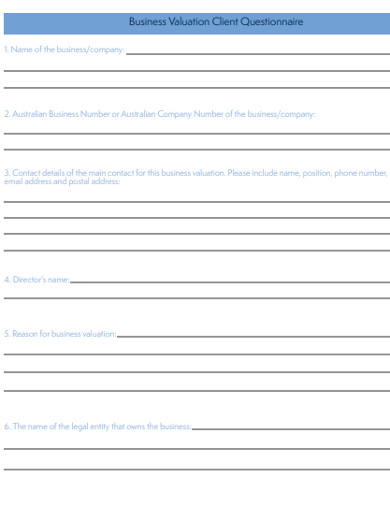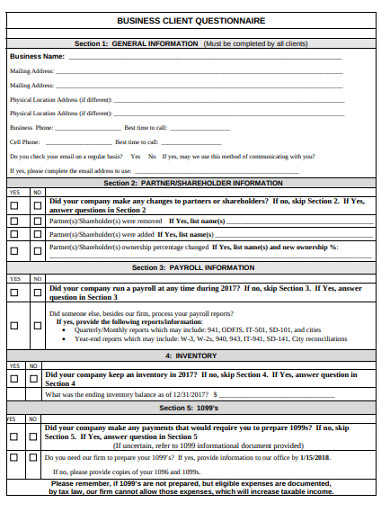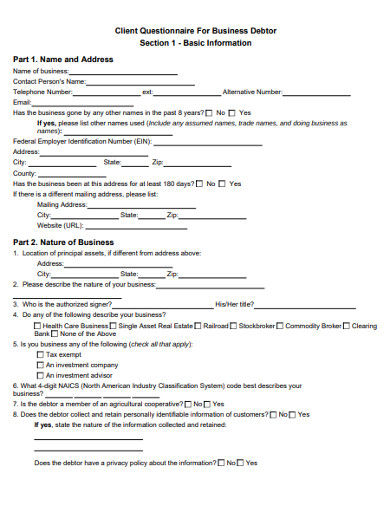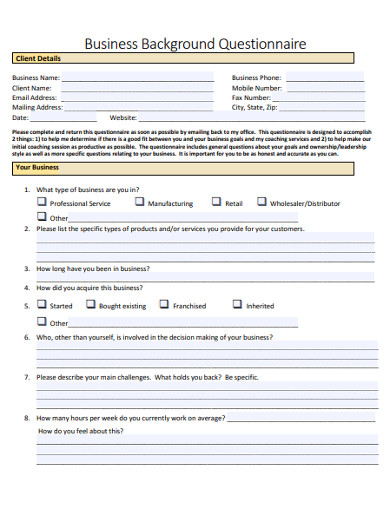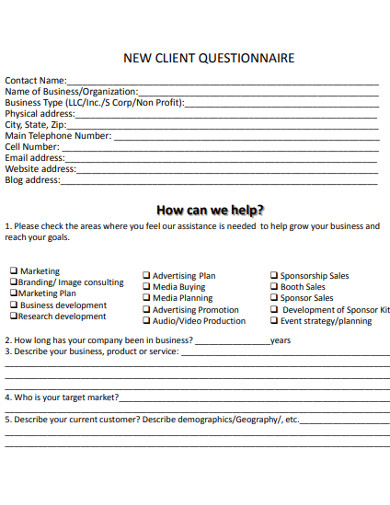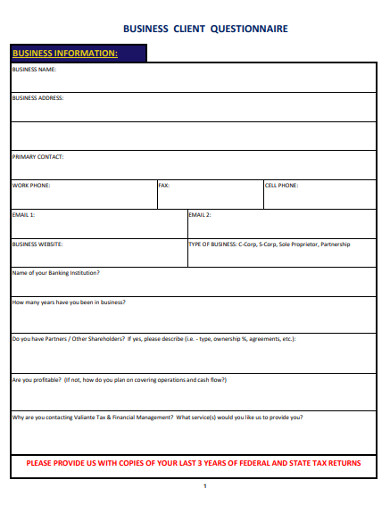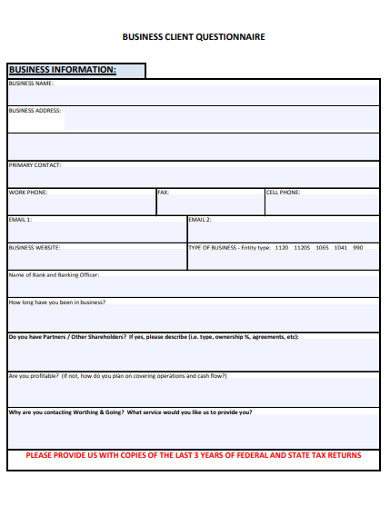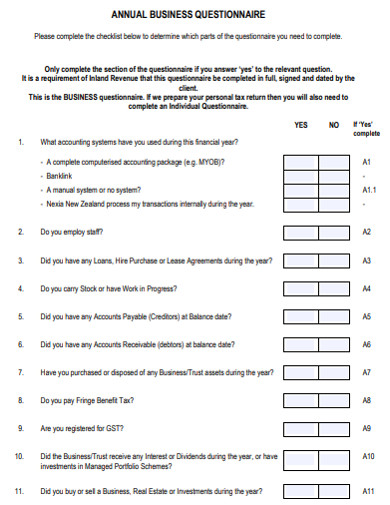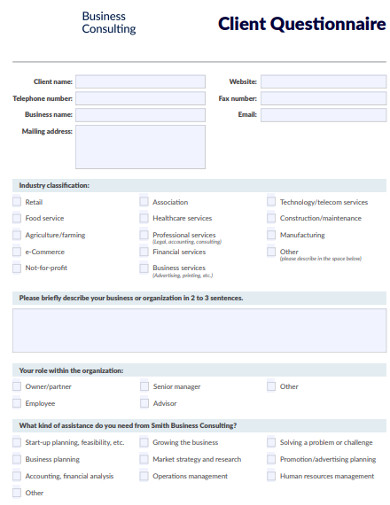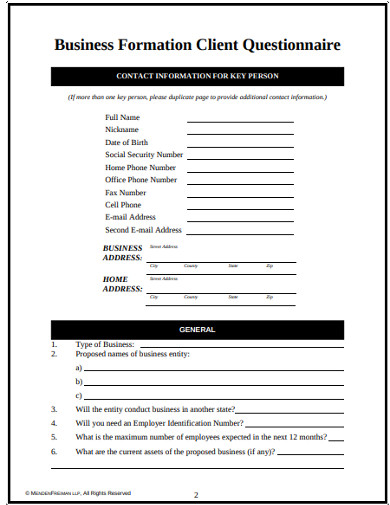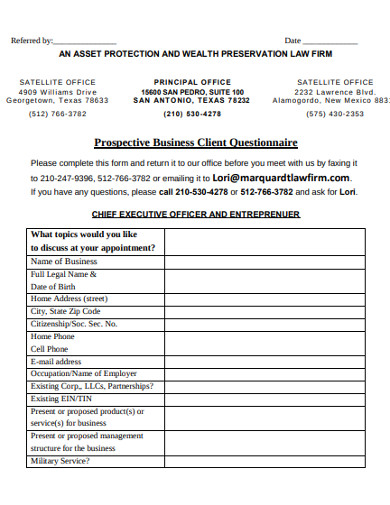10+ Business Client Questionnaire Examples to Download
When you know that you two are not compatible with each other from the start, your interactions will be strained from here and forward. In the business consulting industry, your work requires having a client to work with. But, it doesn’t mean that you have to force the relationship. Before you push through with a partnership, you have to get to know the basics of the clients’ business and their concerns, and if the concern fits you. Business client questionnaires attune your understanding of the project or goal with what the clients have in mind. Imagine it as a single thought bubble shared between you and your client.
Consulting firms, independent consultants, coaches, and advisors can benefit from using business client questionnaires to know the right kind of help and guidance the potential clients need. And they can do this before meeting the clients. The document contains basic information about your clients and their business. It also describes their business concern and the expected results. If you find that this project is not compatible with you and your expertise, you can move on to another client.
Because of the varying nature of the businesses, the client questionnaires will help you deliver more personalized advice or solution that fits your client’s type of business. The forms allow you to ask the right questions so that you can have a mental picture and a good understanding of what it is that your clients want from you. Using the data from the questionnaires, you can knowingly steer the conversation into obtaining the information that isn’t immediately available in the form. They are an invaluable supplement to your research and observations from your interaction with the client.
Consulting in the New World
How can I help? Perhaps this is the core question that is driving the consulting business to be the multibillion-dollar industry that it is today. Since the conception of the consulting firms in 1886, the industry’s purpose has always been to help businesses with their problems. Ideally, it stands as an opposition to applying a standard cookie-cutter solution for a unique problem. In the history of consulting, it was initially assumed that hiring consultants was synonymous with declaring your business is struggling. And business owners didn’t want signs of weakness tagged to their companies. If they do hire consultants, that information wasn’t divulged.
After a while, hiring consulting firms and freelance consultants and advisors made the companies appear more capable. This is because the hired help brought in valuable information and business strategies that eluded the company. The experience, exposure, and expertise that these consultants gained from working outside the company added fresh?—sometimes, the necessary—perspective to address a concern. The consulting industry banked on this invaluable knowledge and expertise.
It was only time before the insider knowledge and trade secrets of the consulting industry became a template available to and accessible by anyone. Today, just about anyone can become consultants and advisors if they put an effort. The Internet, after all, is more a shelf than a vault for knowledge. People can research on things like business process analysis and management. The availability of information and the rise of websites that let companies contact consultants without the help of intermediaries played a part in attracting more competition in the field. As the industry starts to be saturated, what else can you offer to potential clients for the price that they would pay you?
Aside from recognizing these challenges, firms and independent consultants should be proactive in addressing such issues. These are just a few of the many disruptions in the industry that leveled the playing field for new and old players. To remain relevant and capable, you have to go back to the core of consulting: “How can I help?” We can trace our beginnings to the purpose of providing aid for big and small businesses. Client-centric business solutions involve tailoring solutions to what the clients need. During these trying times, success relies heavily on how your results resonated with your clients.
Business client questionnaire is your friend as you move to adapt to the new world disruptions in the industry. The client-centric industry doesn’t mean that you accept every project that comes your way. You also have to look you and your client’s compatibility in tackling the problems. It helps you provide the best advice when talking with your clients isn’t so much of a chore for you. The right consultant and customer relationship is conducive for delivering expert, timely, transformative, and relevant solutions.
10+ Business Client Questionnaire Examples & Templates
More than just an apprisal about your clients and their business, business client questionnaires help find a good consultant-client match. This match makes sure that no one feels taken advantage of in the contract. Your partnership will be more fruitful if both parties actually enjoy working with each other. The product of the partnership, which is the solution to the client’s business concern, will suffer if the relationship is already shaky. Communication is also easier when there is an understanding between the two parties. Make the matchmaking process easier with the questionnaire that fits. The following samples of questionnaires may help you.
1. Business Valuation Client Questionnaire Example
2. Sample Business Client Questionnaire Example
3. Client Questionnaire For Business Debtor Example
4. Business Client Background Questionnaire Example
5. Business New Client Questionnaire Example
6. Simple Business Client Questionnaire Example
7. Standard Business Client Questionnaire Example
8. Annual Business Client Questionnaire Example
9. Business Consulting Client Questionnaire Example
10. Business Formation Client Questionnaire Example
11. Prospective Business Client Questionnaire Example
Finding Your Match
Not all business concerns are right in your alley. It is fine to admit that you are not the most capable person to hand;le a dilemma. For this purpose, your business client questionnaires should be an efficient and effective screening tool that filters concerns that fit you and your expertise. You can provide questions that will give you insights if this client is right for you. For example, you are proficient in business management, but the nature of the concern presented is on the legal scope. Or the client wants immediate results for a problem that will likely take you a longer time. The questionnaire design should be able to screen these issues for you so that you and your clients are a good match for each other.
1. Define Your Priorities
The first thing you should look at is what is the problem at hand. Because your expertise has its limit, give priority to the problem that you are capable of handling. Naturally, you would be more qualified to deal with problems that you have an experience with. Sometimes, some of these concern will find its way into your file. You can refer business concerns that aren’t within your jurisdiction to the more adept people in that field.
2. Do You Have the Time?
Are the expected results realistic and doable in the schedule of the project or goal? You may be able to negotiate the project timeline with your clients, but you should look out for this in the questionnaires. It informs you of the given time you have to produce the results that your clients want. You have to check your capacity and schedule to deliver the required output so that you won’t be wasting your and the client’s time.
3. Know Your Worth
Your job banks on intellectual capital. It may be harder to put a standard price on knowledge and information, but you have to know how much your services are worth. While high fees may drive potential clients to competition, don’t sell yourself cheap. When you know you can match the cost with your service quality, then don’t settle for a minuscule amount for the sake of having clients. This is especially if you have established your name in the game. Keep an invoice for the things you have provided to your clients.
4. Distance Matters
When the clients’ problems and the consultants’ expertise fit like puzzle pieces, another thing to consider is how you would communicate with your clients. Whether you opt for in-office discussions or coffee shop meetings, there is still a considerable advantage in talking about the issue with the other persons physically present in the room. You can ask more questions to gather specific data. When you have to fly miles to discuss with the clients, this relationship might not be sustainable for you. Consider if email and video call correspondence will resolve this issue.
In this industry, consultants and clients have to be a perfect match so that the problem will be addressed smoothly. Aside from understanding your clients, you also have to be knowledgeable about the concern at hand. By screening potential clients and figuring out if you are the right person for the job, you can deliver better results. As new players enter the profession, promising results will keep you distinct from the competition. In the end, your industry will still be about client satisfaction.



